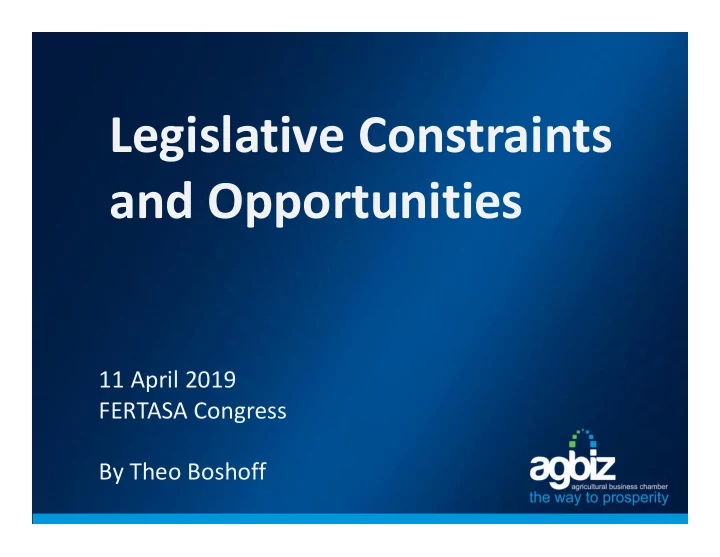

Legislative Constraints and Opportunities 11 April 2019 FERTASA Congress By Theo Boshoff
For today Title of presentation • Draft Fertilizer Bill v Feeds and Pet Food Bill • Climate Change legislation • Waste Exclusion Regulations • Competition law amendments • Protection of investment Bill • Regional facility of the permanent court of arbitration
www.members.agbiz.co.za
Need for an enabling environment Regulation a necessity for any modern economy • Public safety; • Product quality / consumer rights; • Environmental health; • Guard against unfair / corrupt business practices; • Clear framework for dispute resolution; 5
7
Draft Fertilizer Bill • The registration and regulation of fertilizers required for public safety; • Currently regulated by Act 36 of 1947; • Also regulates farm feeds, agricultural remedies and stock remedies; • DAFF in the process of migrating to dedicated legislation; • 1947 Act does not necessarily provide for modern, administratively just procedures. 8
Fertilizer Bill Opportunities • Fertilizer Advisory Committee; • Advise Registrar on regulation and operational matters; • Formal platform for consultation and liaison with industry. • Administrative Justice guarantees; • Right to make inputs and provide evidence to support applications; • Entitled to reasons for decisions; • review or appeal decisions. • Access to records and information; • Product traceability measure to be prescribed; • Foreign supplier accreditation; • Export certification & assistance; 9
Fertilizer Bill Challenges - Duplicate registration requirements: • Fertilizer products • Product safety and standard concerns well understood; • Facilities; • Public safety and standards covered by product registration; • OHS, Environmental concerns, water use etc. already covered by dedicated legislation and permitting requirements (LRA, OHSA, NEMBA, NEMQA etc.) • Raw materials. • Previous uncertainty regarding definition of ‘Fertilizer product’; • Good to clarify definition but why register if it forms part of the end product? 10
Fertilizer Bill Assignment of functions • Assignment of some functions can improve efficiency (e.g. services), but the wholesale assignment of any function under the Act fraught with risks; • Precedent in many industries for assignees to • Provide certain services; • Inspect imported/exported goods; • Conduct compliance audits; and • Certify compliance with compulsory standards. • Assignees do increate the costs of compliance, but where credible companies are appointed it can shorten waiting periods and streamline businesses processes by sourcing-in additional capacity for Government. • However there are certain regulatory functions that should not be outsourced. 11
Fertilizer Bill Challenges • The consideration of licences & permits • Fundamentally a public function; • = Administrative action reviewable by law (PAJA) – lawful decision? Reasons? Rational? Etc. • The Registrar may be liable if decisions are reviewed, leaving DAFF very exposed. • Levies • Where services are rendered the ‘user-pays principle’ should apply, however it should not be used to fund the Regulator’s core mandate; • Compliance • Non-compliance leads to compliance directives, administrative penalties & criminal sanction; • Justifiable to give search & seizure functions to a private company? • Limitations on fundamental rights more appropriate for state entity v private; • Conflicts of interest & perceptions of bias? – cannot be player and referee. 12
Fertilizer Bill v Feeds & Pet Food Bill Feeds and Pet Food Fertilizer Bill • Broad range of • Same assignment assignment; provisions, but industry satisfied as to the • Possibility of core functions that will be functions being assigned; assigned to external companies; • Promote self-regulating system; Collaborative effort key – Public, Private Partnerships with credible industry bodies should be preferred over wholesale assignment of functions 13
Climate change mitigation • Internationally determined contribution under the Paris Agreement; • 5 year transition period before compulsory emission reporting commences for ammonia, lime and soda ash production kicks in; • Carbon budgets & carbon tax NB 14
Climate change mitigation • Environmental regulatory environment tightening up however there is room for innovation and flexibility: NEMA Waste Act – Exclusion Regulations • New regulations which enable companies to apply for exemptions to a waste licence where industrial waste can be re-used; • Current applications include the reuse of soda ash from combustion for soil amelioration; 15
Competition Law Amendments • Competition Amendment Act & draft regulations published in January: Prohibit: • Abuse of ‘buyer power’; • Imposing ‘unfair’ prices on smaller suppliers due to inferior bargaining power. • Price discrimination; • Intention to prevent large companies from discounting prices to the extent that SMMEs cannot compete; • Discount for ‘bulk’ sale may come under spotlight. • Drafts still subject to consultation and refinement. 16
Investment security Previous indications Ramaphoria • Bilateral Investment Treaties • Jobs Summit, Investment lapsed without renewal; Summit, special envoys etc. Protection of Investment Bill; Government Gazette 25 January 2019 • Put SA policy imperatives ahead of international investment • Agreement between SA confidence; Government & Permeant Court of Arbitration (the Hague); • Subject all investors to same treatment and domestic courts – • Set-up regional ‘branch’ for Africa in SA; • limit scope for international arbitration. • U-turn on 2015 PPI Bill. 17
Summary It’s a Mixed-bag • Sector-specific legal framework requires some work - collaboration with DAFF to ensure equitable outcome; • Environmental & commercial legislation tightening up in-line with international trends; • Can be strict, but must be fair; • U-turn on investment policy; • The President that has set us on a path of inclusive growth and investment; • Good signs, but still a lot of work to do. 18
Thank you theo@Agbiz.co.za www.Agbiz.co.za 19
Recommend
More recommend